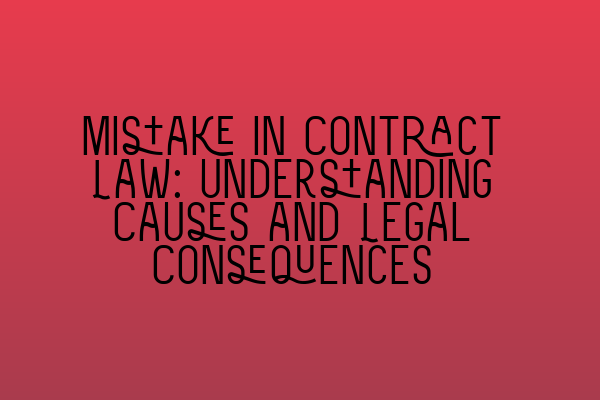Mistake in Contract Law: Understanding Causes and Legal Consequences
Introduction
Contract law plays a crucial role in regulating agreements and ensuring the smooth functioning of business transactions. However, despite the best intentions of parties involved, mistakes can occur during the formation or performance of a contract. In this blog post, we will explore the causes of mistakes in contract law and delve into the legal consequences that arise as a result. Understanding these aspects is essential for both solicitors and individuals involved in contractual relationships.
Causes of Mistakes in Contract Law
Mistakes can arise from various factors, including:
1. Mutual misunderstanding: Sometimes, parties may have different interpretations of the terms and conditions of a contract, leading to misunderstandings. Such misunderstandings can be caused by unclear language, ambiguous clauses, or miscommunication during contract negotiations.
2. Unilateral mistake: An individual party may make a mistake without the other party being aware of it. This could occur when a party is mistaken about a material fact or accidentally enters into a contract under false assumptions.
3. Mistake as to the identity of the contracting party: In some cases, a party may wrongly believe that they are contracting with a specific individual or entity when, in fact, they are dealing with someone else entirely. This can lead to significant issues and potential legal disputes.
Legal Consequences of Mistakes
The legal consequences of mistakes in contract law depend on the type of mistake and its impact on the contract. Here are some important points to consider:
1. Common mistake: When both parties are mistaken about the same fundamental fact, it can render the contract void. In such cases, the courts may choose to set aside the agreement, restoring the parties to their original positions before the contract was entered into.
2. Unilateral mistake: A unilateral mistake generally does not invalidate a contract unless specific circumstances make it unjust to enforce the agreement. For instance, if one party takes advantage of the other party’s mistake or if the mistake is so fundamental that it renders the contract impossible to perform.
3. Mistake as to identity: If a mistake is made regarding the identity of the contracting party, it can have serious consequences. If the mistaken party intended to contract with a specific person or entity, they may seek to rescind the contract and claim damages. However, if the mistake could have been avoided through reasonable diligence, the courts may not allow the contract to be set aside.
Protecting Against Mistakes
To minimize the risk of mistakes in contract law, solicitors and individuals should:
1. Clearly define the terms and conditions of the contract: A well-drafted contract should include precisely worded clauses that leave no room for misinterpretation or misunderstanding. Ensuring that the language used is clear and concise can prevent disputes arising from ambiguity.
2. Conduct thorough due diligence: It is essential to verify the identity, credentials, and authority of the other party before entering into a contract. This will help avoid mistaken identities and potential fraudulent activities.
3. Seek legal advice: Engaging the services of a solicitor experienced in contract law can provide invaluable guidance and expertise. Solicitors can help ensure that contracts are legally sound, properly executed, and offer protection against potential mistakes.
Conclusion
Mistakes in contract law have the potential to lead to significant legal consequences, affecting the rights and obligations of parties involved. By understanding the causes of mistakes and the legal principles that govern them, solicitors and individuals can better navigate the complexities of contract law. Clear communication, careful drafting, and seeking professional legal advice are key to minimizing the risk of mistakes and safeguarding the interests of all parties involved in a contract.
Related Articles:
– Mentorship for Aspiring Solicitors: Nurturing Talent in the Legal Field
– Legal Challenges and Pitfalls: Navigating the Complexities of the Legal System
– Mastering the Solicitor’s Path: Prepare for the Journey Ahead
– The Benefits of Becoming a Solicitor: A Rewarding Career
– Success on a Silver Platter: Achieving Work-Life Balance in the Legal Field
